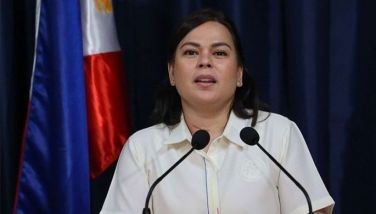Providing an on-the-ground perspective

A group of journalists from Manila are here to take part in a reporting tour program organized by the Philippine embassy in Washington, DC to highlight the work that the embassy and posts are doing in accordance with our foreign policy pillars, and to elevate the economic profile of the Philippines. On many occasions, President Ferdinand Marcos Jr. has stressed that he wants to boost the economic aspect of the relationship between the two nations.
A core objective of the 2022 media reporting program is to give the participating journalists – who come from broadcast, online and print news outfits including The Philippine STAR – an on-the-ground perspective on the dynamics that underpin the relationship between the Philippines and the United States.
This is actually the second iteration of this one-of-a-kind program that we started in November 2019, which allowed journalists to engage not only with officials from the Philippine embassy but key figures from various government agencies such as the State Department and the Pentagon. Interviews with American think-tanks and key members of the Filipino-American community were also arranged, with the activities also allowing the journalists to build networks that served as reliable sources of information and, more importantly, helped deepen their knowledge on the issues that impact relations between the longtime allies.
Our friends from the State Department and the Pentagon were appreciative of the outcome of the program in 2019 which was very successful. We would have wanted to make the reporting tour a yearly activity, but the COVID-19 pandemic interrupted our plans, which is why we’re happy that the situation has eased, allowing us to arrange the continuation of the program this year, which we have expanded to cover not only defense and security but foreign policy, trade, tourism and, of course, the people-to-people ties which underpin the relationship. Supporting us once more in this initiative is our country’s flag carrier, Philippine Airlines, which we are happy to note is starting to soar once again and is on track to recover from the impact of the pandemic.
Naturally, the journalists who cover the Foreign Affairs and business/economic beats want to examine the current status of US-Philippines bilateral relations under the administrations of President Bongbong Marcos and President Joe Biden, given the regional and global challenges that could mutually impact the two nations. Aside from the security and defense aspect of the partnership, the journalists also want to explore the mutual challenges faced by the longtime allies, including issues regarding trade and the economy, climate change, food security and recovery from the COVID-19 pandemic (whose impact as we all know continues to be felt by countries all over the world), and explore areas that provide opportunities for further cooperation.
Like in the 2019 program, we arranged interactions with key officials of various government agencies, starting with Director Amy Archibald of the Department of State’s Office of Maritime Southeast Asia, Bureau of East Asia and the Pacific who delved on the importance of having a Code of Conduct to govern the activities in the South China Sea as this could lead to an “international rules-based system that would allow a free and open, prosperous Pacific.” Upholding a rules-based international holder is critical in maintaining a free and open Indo-Pacific, and this message was also reiterated by US Assistant Secretary of East Asian and Pacific Affairs Daniel Kritenbrink during his recent visit to Singapore.
We also arranged discussions with key executives from think-tanks such as Shay Wester, Director of Asian Economic Affairs of the Asia Society Policy Institute which tackles major policy challenges that confront the Asia-Pacific in the areas of security, prosperity, sustainability and the development of common norms and values for the region; and Greg Poling, Director of the Southeast Asia Program and Asia Maritime Transparency initiative of the Center for Strategic and International Studies.
In his latest book, “On Dangerous Ground: America’s Century in the South China Sea,” Greg Poling discusses the complex disputes surrounding the South China Sea, which has increasingly become a source of concern for the United States and its goal to maintain freedom of the seas as it intersects with US national security interests.
There were also deep-dive discussions on the work of attached agencies, with the journalists engaging with Philippine Air attaché Col. Dennis Alcarde, Philippine Military attaché Col. Arthur Romanillos who spoke on AFP modernization efforts and Police Brigadier General Wilson Lopez who tackled hate crimes.
One of the topics during the meeting with Commercial Counselor Kenneth Yap was the GSP – the Generalized System of Preferences – which is the oldest and largest US trade program that provides nonreciprocal duty-free privileges for over 3,500 products entering the US market from 119 beneficiary countries, among them the Philippines.
Unfortunately, the GSP expired in December 2020 and no reauthorization has been issued to date, but what is surprising to note is that GSP eligible Philippine exports to the US surged to more than $3.1 billion or 30 percent higher compared to 2020. Aside from having the GSP reauthorized so that eligible Philippine exports will enjoy tax privileges again, a priority is increasing US investments in promising sectors such as IT-BPM and renewable energy, among others.
We’re pleased to note that this program is appreciated by our host country, with some of our friends in Washington now thinking of organizing a similar media reporting tour program for American journalists to visit the Philippines and see for themselves the real situation on the ground.
* * *
Email: [email protected]
- Latest
- Trending




























